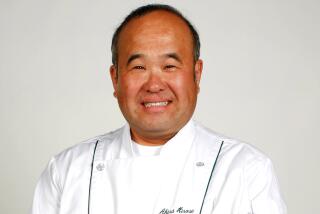Japan ‘Royalty’ Turn Out to be Glitter, Not Gold
- Share via
TOKYO — To the star-struck guests, it must have seemed like Tokyo’s wedding of the year.
Prince Arisugawa wore the grand uniform of an honorary general. His bride wore elaborate and archaic court robes.
Among the approximately 350 guests were Junichi Ishida, one of Japan’s most famous actors, and numerous celebrities from Japanese television. The location too was fittingly prestigious, an exclusive private club on the grounds of the Canadian Embassy, just a stone’s throw from the Akasaka Estate where numerous members of the imperial family reside.
Except that the “imperial wedding” back in April now appears to have been an elaborate hoax. The “imperial couple” were last week arrested along with an accomplice for allegedly conning guests out of about $110,000 in wedding gifts. The Imperial Household Agency curtly explained that the Arisugawa family, from which the groom claimed descent, died out 90 years ago.
“Satohito Arisugawa” is now being called Yasuyuki Kitano, a 41-year-old fraudster from Kyoto trading on a false claim to royalty. His “bride,” 45-year-old Harumi Sakamoto, has been revealed as a divorced mother of two -- not the former announcer she said she was. The marriage itself is said to have been a sham.
Japanese media have reported the story with a hint of amusement as well as amazement. During the last week, television shows broadcast interviews with embarrassed wedding guests and footage of Kitano walking stiffly on stage as the guest of honor at an unidentified party while the emcee gushed: “It’s not every day you get this close to a member of the imperial family.”
A thirst for contact with Japan’s remote royals may explain why people were tricked. Espa Ito, a celebrity psychic who attended the wedding, told Japanese television: “For a hick like me to get invited to an imperial wedding was quite something.”
Ito said he should have been more suspicious about the unspectacular food and the fact that the sophisticated presents Japanese couples traditionally give to show appreciation to guests consisted of nothing grander than cheap cake and a plate engraved with the Arisugawa family crest.
The fake wedding’s notoriety has led to an Arisugawa plate and pieces of wedding memorabilia appearing for auction on the Web site of Yahoo Japan, where bids have reached $900.
Other guests may have wondered why they were asked to pay $90 for souvenir pictures of the couple even though, as is traditional in Japan, they had already been expected to bring $270 each in cash gifts. One guest reportedly brought ten times that amount.
Police have so far arrested Kitano on suspicion of taking money from guests for a fake wedding. The wedding reportedly netted a little over $7,000 profit after expenses.
But Kitano may face additional charges for other scams.
More than ten years ago, “Prince Arisugawa” offered to raise money for a children’s charity started by the Amatakagahara Shrine in Miyazaki, western Japan. In fact, the shrine says it never saw a penny despite selling goods on behalf of Kitano, such as pricey “mineral water,” now suspected to be bogus, carrying the mark of the Arisugawa family and the imperial chrysanthemum mark. The shrine has supplied information about Kitano to the police.
Senshu Tanaka, a priest from the shrine, said: “To prey on a project for children is unforgivable. I don’t even want to talk about it. I completely believed he was Prince Arisugawa. When he said he would help I was moved to think there was such a great person in the imperial family. He said he could raise $36 million in 3 years. It was a big lie.”
Hidenori Sakurai, former editor of the women’s magazine Josei Jishin, which regularly runs stories about the imperial family, said: “In Japan, especially among older people, the imperial family is still respected. So there are lots of cases of people trying to capitalize on that.”
Kitano may also face the wrath of one of Japan’s far-right groups, the Nihon Seinensha, of which Kitano was made honorary president.
Such fringe groups emphasize loyalty to the emperor and see him as the head of the “Japanese family.” They were flattered to be endorsed by a man they believed was his relative. Kitano resigned the post this month.
Kitano and Sakamoto’s somewhat confusing version of events has been revealed in interviews to Japanese media before their arrest and accounts leaked by investigators. Kitano has reportedly said that he was told in the 1980s by a member of the imperial family that he was his son. Sakamoto said they didn’t have to register the marriage because they are royals. Both deny fraud.
Many Japanese have been asking themselves how Kitano got away with impersonating royalty for so long.
Seiichi Tanimoto, director general of a Hiroshima peace group, met “Prince Arisugawa” when the latter was invited to a memorial lecture in Hiroshima in 2000.
“He seemed eminently sensible and a fine man,” Tanimoto said. “I felt nothing strange and of course I never doubted he was a member of the imperial family.”
Japanese royals typically work in behalf of worthy causes, but the public rarely meets them and knows little about them. With his relative accessibility and informality, such as a fondness for karaoke, “Prince Arisugawa” successfully sold himself as a royal of the people.
*
Hisako Ueno of The Times’ Tokyo Bureau contributed to this report.
More to Read
Sign up for Essential California
The most important California stories and recommendations in your inbox every morning.
You may occasionally receive promotional content from the Los Angeles Times.













